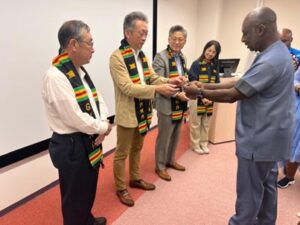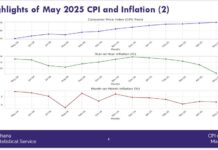In line with the Ghana Nuclear Programme Infrastructure Development agenda, the Ghana Atomic Energy Commission (GAEC), through the support of Ghana’s Mission in Tokyo, initiated a technical cooperation with the JAIF International Cooperation Centre (JICC) an entity established under the Japan Atomic Industrial Forum (JAIF).
The objective of this partnership is to provide cooperation for nuclear energy development in an effective and efficient manner, and to serve as a contact window and facilitator towards promoting concrete cooperative activities such as the dispatching of nuclear experts, inviting trainees, hosting seminars, etc.
both within and outside the country of Japan. This collaboration between Ghana and Japan is to help facilitate knowledge transfer—help with the development of the competencies of Ghanaian professionals in nuclear science and technology.
Last week a delegation from GAEC, the media, academia and other stakeholders visited Japan to understudy advanced safety measures of nuclear power plants. The delegation was headed by Ernest Owusu-Afari, Board Member of the Nuclear Power Institute (NPI).
This technical visit was aimed at building the capacities of participants on advanced nuclear safety and the technology of nuclear power plants—in this particular case, the Japanese nuclear power programme.

Participants were taken on tours through crucial nuclear installations; they had meetings with noted industry players within Japan, and, overall, were presented with Japan’s very modern nuclear power stations and technologies—this provided them with very visual presentations of theoretical learnings.
The team visited nuclear facilities such as the Tsuruga Nuclear Power Plant, the JAPC Mihama Nuclear Emergency Assistance Center (M-NEACE), the Nuclear Power Training Center (NTC), the Fukui Nuclear Center At Home, the JGC/IHI Holding nuclear collaborative effort, Japan Atomic Energy Agency (JAEA), and enjoyed the tutelage of experts such as Hiroki Takimoto and Toshihiro Yamakawa, both being General Managers of JAIF International Cooperation Center; and Kurauchi Hironobu, Deputy Superintendent, Tsuruga Power Station.
The delegation left with a far deeper understanding and appreciation of the intricacy yet simplicity of nuclear power, the checkered past yet straightforward propitiousness of nuclear energy in the modern world, and the enduring importance of nuclear power programmes to national economies—particularly to a developing economy such as Ghana.

Ernest Owusu-Afari, Board Member of the NPI and Head of the delegation capped off this highly impactful five-day visit with these words. “The power of the atom is the gift of the creator to humankind. It exists for us to exploit, just like all other natural phenomena and resources. But of course, in our utilisation of such resources, we must always exercise the necessary cautions—for the benefits of our own selves and that of the generations yet unborn.
Nuclear energy continues to be utilised worldwide—by the developed and developing world alike. Ghana has no reason to be fearful of it. Nuclear power is an indispensable alternative source of energy—especially in this era where climate change remains one of the world’s greatest concerns.
We should have the self-belief that just as nations of the world have employed nuclear power for their national growths, so can we. Looking at a country like Japan, what we see is a meticulous strategising—a deliberate step-by-step approach towards the development of a nuclear power programme.
The Japanese government has taken the pains to undertake continuous education and sensitisation campaigns, with the aim of demystifying nuclear power for the populace. And needless to say, this has been a successful journey.
There is a lot Ghana can learn from Japan on this front. Our nuclear journey must not race ahead of the Ghanaian society. The Ghanaian populace must be brought along on this journey. They must be made to understand in full the opportunities and risks and how those risks will be mitigated.
That is the only sure way of devising for ourselves, a successful national nuclear power programme. The potential of nuclear energy is enormous. This energy source characteristically has such an immense multiplier effect—it has the capacity of speeding both our industrialisation and digitalisation drive, creating jobs, and overall, driving our development agenda.”
In the past three years, this technical cooperation has witnessed over 450 Ghanaian professionals trained in several virtual workshops on various thematic areas under nuclear power.
The makeup of trained professionals has comprised a perfect mix of industry experts, technical organisations, private sector players, the media, and all such relevant entities and individuals who have such direct and indirect parts to play towards the realisation of Ghana’s dream of the successful establishment and operation of a nuclear energy programme—one which will lead to the boosting of the nation’s industrialisation, digitalisation, and overall, developmental agenda.










